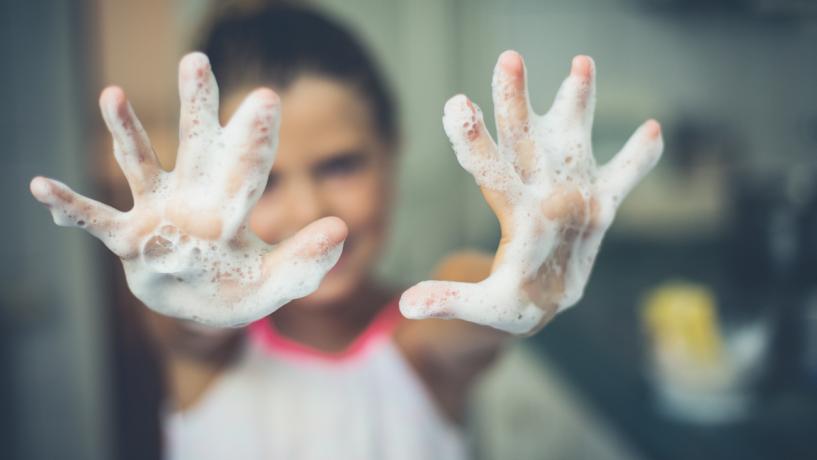
Global Handwashing Day is Monday, October 15th
National Cream Puff Day, National Squirrel Appreciation Day, National Ferris Wheel Day and now, yes, Global Handwashing Day. You might have objections to some of the outlandish excuses for making a day special, but none of us should object to a day dedicated to handwashing.
The simple act of handwashing improves your health and the health of others. Correct handwashing means we get sick less and most importantly, we help prevent food-borne illness.
Why Global Handwashing Day?
Global Handwashing Day was started in 2001 by a committed group of people at The Global Handwashing Partnership. It is now a coalition of individuals and organisations across the world.
A core belief at The Global Handwashing Partnership is that everyone in the world can be empowered and motivated to protect their health and the health of others through handwashing with soap. All of us at the Australian Institute of Food Safety (AIFS) couldn’t agree more.
Handwashing Q&A
Although handwashing is one of the simplest tasks for maintaining good hygiene, dozens of myths and misinformation often plague it. To help set the record straight and ensure you celebrate Global Handwashing Day in style, we’re answering the top ten handwashing questions we receive from customers.
Q1) How many times per day should I be washing my hands?
How often you wash your hands depends on how you spend your day. A good rule of thumb is to wash your hands:
- before, during, and after preparing food
- before eating food
- before and after caring for someone who is sick
- before and after treating a cut or wound
- after using the toilet
- after changing diapers or cleaning up a child who has used the toilet
- after blowing your nose, coughing, or sneezing
- after touching an animal, animal feed, or animal waste
- after touching garbage
- after sharing your mobile device
You might be surprised to see ‘after sharing your mobile device’ make the list. Your mobile device has ten times more bacteria than a toilet seat.
Q2) Is the “Happy Birthday rule” true?
Yes. The “Happy Birthday rule” states that you should sing Happy Birthday to yourself from beginning to end twice. This should take about 20-30 seconds which is the correct handwashing time.
Q3) Does wearing gloves mean I don’t need to wash my hands?
No. Gloves can have holes in them, allowing bacteria to enter the glove and multiply. Using gloves can protect your hands from chemicals and transferring germs, but gloves aren’t a 100% barrier for bacteria.
Q4) Is it true I can get diarrhea from not washing my hands?
Yes. Diarrhea is a gastrointestinal disease that is often caused by improper handwashing. Incorrect handwashing is also linked to:
respiratory illnesses like Pneumonia and Influenza
infections such as Ebola
Q5) Can using alcohol-based hand sanitisers replace handwashing?
Alcohol-based sanitisers do not remove dirt when your hands are visibly soiled, never use them in place of handwashing. Its best to think of hand sanitiser is as a compliment to handwashing. Use hand sanitisers when soap and water can’t be accessed.
Q6) Is it better to dry my hands with a disposable paper towel?
Yes. Wiping your hands with a cloth towel opens you to cross-contamination. Damp towels are breeding grounds for bacteria. Always use a paper towel or hand blower to dry your hands after washing them.
Q7) Is it necessary to use hot water when washing my hands?
Recent research has proven cold or lukewarm water is as effective as hot water when washing hands. However, hot water will maximise the lathering effect of soap. The more lather, the easier it will be to remove dirt, soil and grease that contain harmful germs.
Q8) Is antibacterial soap more beneficial than regular soap?
When using the correct amount of soap recommended by the manufacturer, all soaps are equally effective at removing germs.
Q9) What is the correct way to wash my hands?
To correctly wash your hands you need to follow (in order) six steps:
- Wet your hands
- Apply liquid soap
- Lather and scrub
- Rinse
- Turn off tap
- Dry hands
Q10) How do I get my coworkers and staff to wash their hands more frequently?
Keeping sinks clean and handwashing areas stocked with soap and disposable towels will encourage handwashing.
Also, its vital to have posters displayed prominently at handwashing stations, in break rooms and in washrooms help to educate and remind people of the importance of handwashing.
To celebrate Global Handwashing Day, be sure to download, print and display our AIFS Handwashing poster.





